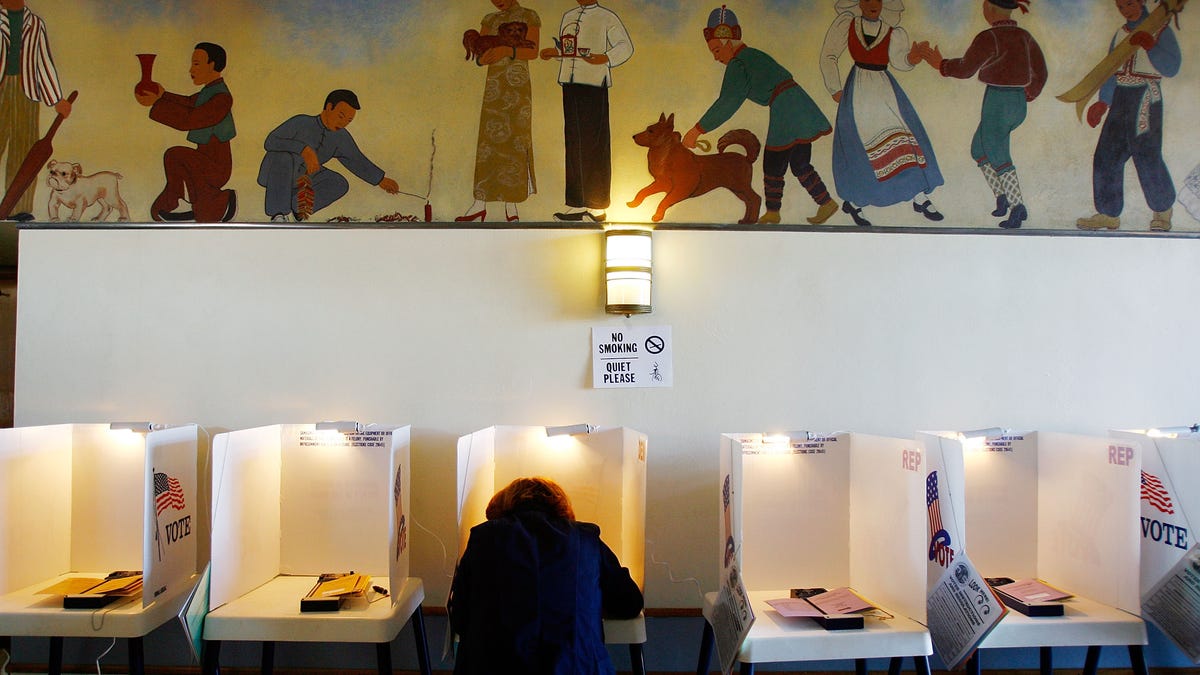
LOS ANGELES, CA - FEBRUARY 05: Voters go to the polls for Super Tuesday primaries in the predominantly Latino neighborhood of Boyle Heights on February 5, 2008 in Los Angeles, California. Latinos are an increasingly important factor in California where they are expected to account for 14 percent of the vote and tend to favor presidential hopeful Sen. Hillary Clinton (D-NY) over rival Sen. Barack Obama (D-IL). At 44 million, Latinos make up15 percent of the US population, the nation's largest minority group according to the latest Census Bureau estimates. (Photo by David McNew/Getty Images) (2008 Getty Images)
Donald Trump's recently declared the election will be rigged against him. He believes is not fair for courts to throw out restrictive laws which result in voter suppression. Trump told The Washington Post, “The voter ID situation has turned out to be a very unfair development. We may have people vote 10 times.”
The strongest statement you can make is with your vote. You must be part of choosing the next president of the United States.
The reality is the voting system will not allow anyone to vote more than once. It is simply not possible, but Trump's message is, keep implementing more restrictive, voter suppressing tactics. Suppression tactics often seem benign and logical but result in denying votes to change election outcomes.
Compounding the problem is the fact that some people, in particular people of color, say they will not vote to make a statement, because their votes do not matter, or they are not happy with the choices. However, messages encouraging people of color not to vote only serve to suppress important voices. Refusing to vote silences your own voice and has the same effect as the voter suppression efforts. Remember, “Su voto es su voz,” or “Your vote is your voice.”
Votes and voices are suppressed by: state laws requiring voters to provide a specific photo ID at polling stations, closing voting sites without notice, not allowing someone to pre-register to vote or to vote early, or not allowing someone to register to vote on an election day. In Arizona, polling places were closed during the last primary election.
Since 1848, barriers including laws, literacy tests and poll taxes have been used to keep women and people of color from being part of the political process or influencing elections results. A woman's right to vote resulted from 72 years of hard work. It is hard to believe that it was legal to create state and local barriers to prevent African Americans and other people of color from voting was legal until the 1965 Voting Rights Act.
- Appeals court rules Texas voter ID law discriminates against minorities, orders fix
- With Florida critical to winning White House, Puerto Ricans become the big prize
- DNC: Clinton surrogates urge Latinos to register to vote; hope high turnout will hurt Trump
- Best pix of the week
- Mexico’s disabled cowboys defy expectations and traditions
Unfortunately, the story does not end there, as our numbers continue to grow, along with the threat of increased influence, voter suppression becomes more creative.
In the upcoming presidential election new voting restrictions will be in place in 15 states just in time to suppress votes and influence election results. Alabama, Arizona, Georgia, Indiana, Kansas, Mississippi, Nebraska, New Hampshire, Ohio, Rhode Island, South Carolina, Tennessee, Texas, Virginia, and Wisconsin have all put new laws ranging from stricter photo ID requirements to registration restrictions.
As voter suppression tactics increase, court challenges follow but may not be decided in time for the upcoming election. In July 2016, the Fourth Circuit Court of Appeals struck down voting restrictions in North Carolina and a federal court enjoined North Dakota’s photo ID law in August 2016. The federal court struck down a North Carolina voter ID law saying it was discriminatory, and targeted black voters, with almost surgical precision. Court challenges of restrictive laws in Texas and Wisconsin still resulted in requirements more restrictive than what was in place for the 2012 presidential election.
In Arizona an effort to suppress voters ended up in court. Polling places were reduced from 200 to 60 in Maricopa County on election day. Most importantly, the polling places in densely-Latino communities were closed on the primary election day. More than 40 percent of Phoenix’s 1.5 million residents are Latino. Democratic State Sen. Martin Quezada told AZCentral.com the lack of available polling locations for the Latino community was problematic.
There is so much at stake in this voting cycle. The next president may get an opportunity to nominate three new Supreme Court Justices. They will likely decide the outcomes of immigration reform legislation, universal healthcare, women’s reproductive rights, LGBTQ rights, and the unending challenges to affirmative action.
Voting is something we now take for granted. Before you decide not to vote as a protest or to make a statement, remember if you don't vote, you lose the right to complain. President Obama’s famous line, “don't boo, vote!” is the best antidote for voter dissatisfaction and voter suppression tactics.
If you are tempted to opt out of voting in the upcoming elections either to make a statement or because you believe neither candidate is perfect, don’t. I say, go ahead and boo, but you must vote. The strongest statement you can make is with your vote. You must be part of choosing the next president of the United States.
